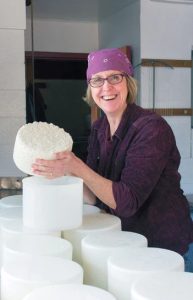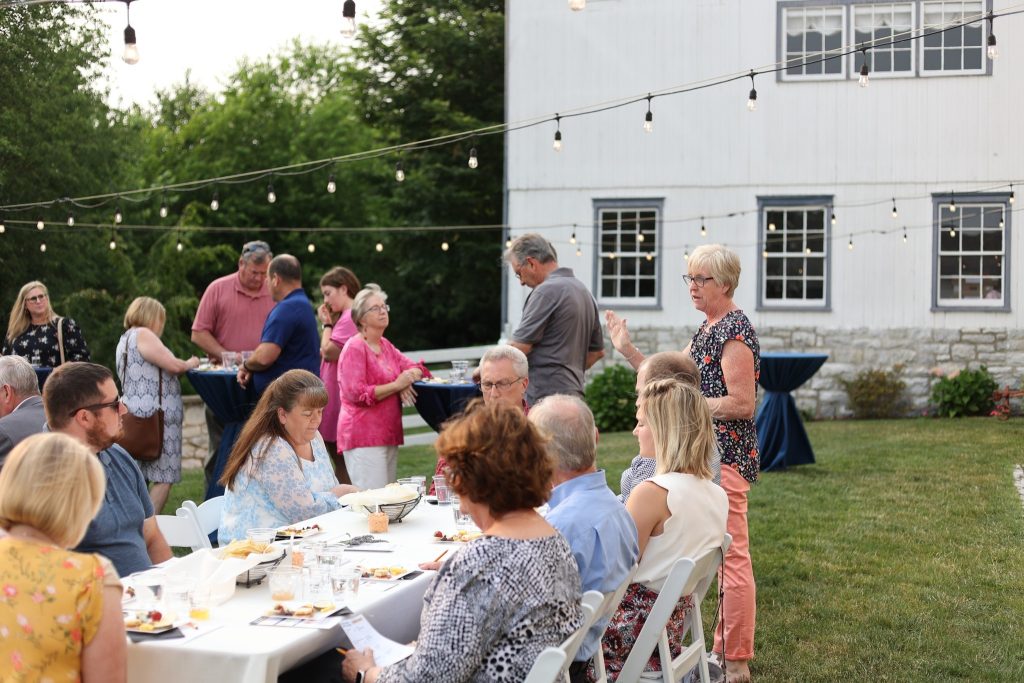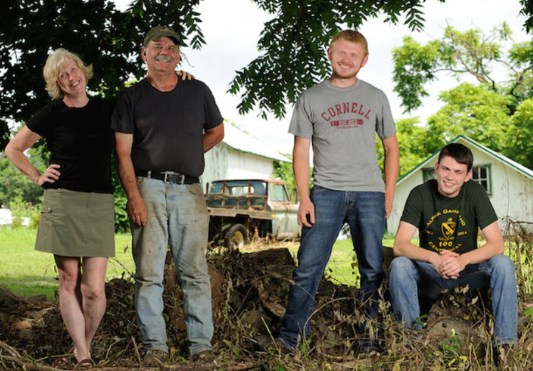
Sue Miller Was Interviewed in the “Cow-Side Conversations” Podcast
In the Center for Dairy Excellence’s latest episode of the “Cow-Side Conversations” podcast, Sue Miller of Birchrun Hills Farm in Chester County, Pennsylvania shares how her family is adding value to their small dairy farm with artisan cheese. During the podcast interview, she describes how they manage their herd to produce high-quality milk with an ideal ratio between fat and protein, some of the skills that are critical to her role as a cheesemaker, how they work as a family seven days a week, and the community and growth opportunities that are forming through the resurgence of artisan cheese across the state.
Sue opens the podcast by describing the size and scale of her family’s dairy operation. Located in northern Chester County, her family manages 54 acres and milks approximately 70 cows. Their cows are on pasture, and the farm has been in her husband, Ken’s, family for over 100 years. A true family business, Ken manages the cropping side of the dairy operation and Sue oversees the cheese business. Their son, Randy, is the herdsman and manages all the reproduction and youngstock. Their other son, Jesse, spends half his time on the cropping side and half his time with cheese-making – managing their farmers’ markets, retail partners, and online presence.
Sue describes her family as “first-generation farmers,” which helped spark their decision to add value to the dairy operation by making cheese. Even though the farm has been in her husband’s family for 100 years, it had skipped a generation.
“We came onto this ground a little bit differently. There are challenges when you don’t have multi-generational equity in the land. You may have to make some different decisions. As milk markets became more and more erratic, we were struggling to make ends meet on a small dairy farm,” Sue explains. “As we struggled with low milk prices, we realized we needed to do something different. I woke up one morning and wondered if maybe I could make cheese. We were thinking, ‘What can we do to get the highest value from our milk?’ We felt cheese was a really good avenue for that.”
She started by taking a cheese-making class through Pasa Sustainable Agriculture. A nonprofit farm that was located down the road from Sue’s dairy operation also had a vacant cheese-making facility available. They offered it to Sue and her family to help them get started.
“That’s a very important part of the story of our farm. We did not have the capital. We were really struggling to make ends meet, so that allowed us to rent the cheese-making facility at a very reasonable price,” Sue shares in the podcast. “It allowed us the opportunity to get started and see the potential of where it could go. It was very great for our farm.”
Now, Sue uses 50 percent of their milk for cheese-making, and the rest goes to a small cooperative. She makes cheese five days a week and often works on two cheeses at a time. Sue credits their farm’s landscape with helping to maintain high-quality milk, with their dairy barn sitting on a hill above the creamery.
“We’re able to gravity feed the milk from our bulk tank down into the creamery, which is really great. The less the milk is disturbed, the better the quality. We don’t want to break up the fat globules or be too harsh on the milk. We want it to come in the most perfect way possible,” Sue adds.
With a herd of both black and white Holsteins and red and white Holsteins, the Miller family aims for strong butterfat and protein levels – their goal is over 4 percent for butterfat and 3.2 percent for protein. By working towards a particular ratio between the fat and protein, Sue says it guides the flavor and quality of their milk to enhance specific styles of their cheese.

“We knew we had this really beautiful milk because our cows are out on pasture and we’re feeding a high-forage diet. How the milk originates with the soil and what the cows are eating helps to guide us in our cheese-making,” she says. “If we don’t have high-quality milk, we’re not going to have quality cheese. It really starts with the milk.”
Sue also describes the various regulations and permitting requirements they have to follow as cheesemakers. They carry a manufacturer’s dairy/cheese-making permit from the Pennsylvania Department of Agriculture and get inspected every three months. In addition, they are under regulatory oversight from the FDA and must provide antibiotic testing for every batch of cheese they make.
“It’s very manageable when you have a well cared for herd of cows, a clean facility, and you’re educated, thoughtful and interested in doing the very best,” Sue shares. “Cheese-making comes with a really weighty responsibility. You’re feeding people. You want to make sure you give the safest, most quality product that tastes the best and gives the best experience to every person you hand your cheese to. It’s a very special relationship.”
In terms of their marketing and sales process, Sue shares how they established their customer base. When they first started, they sold directly to consumers at farmers’ markets. These opportunities helped her learn what consumers in her community wanted, how to interact and find common ground, and how to best share their farm’s story so they could sell the cheese they were producing. Today, Sue and her family sell cheese at approximately seven farm markets per week. They also see a 30 percent increase in sales during the last quarter of the year from holiday cheese shipments and gift boxes.
“One thing I’ve learned from going to farmers’ markets is that the people in your community and the consumers you meet really do care about the dairy industry,” she shares. “Farmers just don’t really come across [these consumers], so they don’t know how much people really do care about the rural landscape across our state and the survival of small-town farms like ours.”

During the podcast interview, Sue describes some of the skills that are critical to her role as a cheesemaker.
- Understand the milk you work with.“Knowing the milk is really important. As artisan cheesemakers, we’re not standardizing the milk like you would if it went into a big industrial plant. We’re embracing the milk as the herd changes, depending on where the cows are in their lactation or how the feed is changing.”
- Learn the science and technology behind cheese-making. “You can understand the milk, but if you don’t understand the technology behind making cheese, you’ll be lost.”
- Observe and pay attention. “Every load of milk that comes in here, I pull some of it and drink it every morning to see if I taste anything different. Randy and I meet every couple days to talk about the herd and if any of the feed is changing.”
- Listen to your intuition.“So much of what I do is intuitive. I know that sounds crazy since you have this science of cheese-making, but I really listen to my intuition – whether it’s what I’m going to make or whether I want to go to an event. Sometimes I do things that look like I shouldn’t be doing it, but my intuition says to go for it. It hasn’t really guided me wrong. I think it’s really important to listen to yourself.”
Sue says the collaboration between Pennsylvania cheesemakers, and the growth potential they see in the MidAtlantic region, make it an exciting business. Through organizations like the PA Cheese Guild, creameries and farmers are finding ways to collaborate and work collectively to reach more consumers.
“Sometimes in a competitive marketplace, people aren’t always willing to [share their knowledge]. The cheese-making world is very different. People want to see each other do well,” Sue explains. “I do think we’re at this point where we can see more growth happening in the state, and we can work together to build those consumers. There are a lot of people living in the MidAtlantic region that we can reach very easily with our products who know nothing about Pennsylvania cheese and Pennsylvania farms. I’m excited about it.”
For other dairy farmers who might want to get started with cheese-making, Sue says ensuring you have the right team in place is crucial.
“If somebody would have told me when I started that there should be somebody to manage the cows, somebody to make the cheese and somebody else to market it, I would have said, ‘No, I can do all that.’ You can do it for a little bit, but it’s hard,” Sue says. “We started making cheese because we love cows, but I rarely get to milk or be with the cows. I spend all my days at the cheese room. So, if you’re going to make cheese, make sure you can do without that person to milk the cows or feed the calves. As you grow the business, it has to be someone who is really dedicated to the cheese-making side of the business to make it work.”
To listen to the full podcast interview with Sue Miller, visit www.centerfordairyexcellence.org/podcast. The podcast is also available on Spotify, Apple Podcasts, and Amazon Music. With a new episode released each month, this interview is the second episode in the fourth season. The podcast was designed to share real-time farmer insight, tricks of the trade, and inspiring stories from dairies across Pennsylvania.

